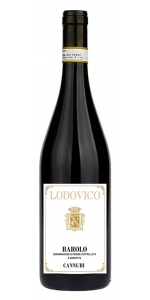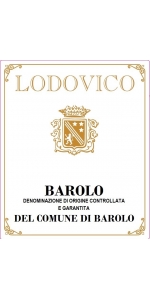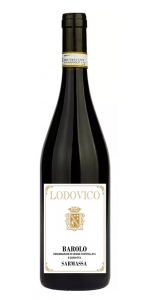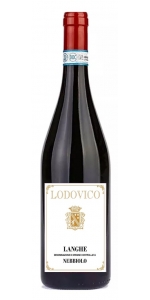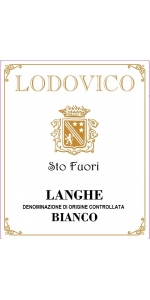Wine from Lodovico
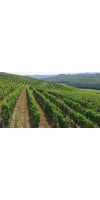
Founded by Lodovico Borgogno in 1950, the Estate is now run by 4th generation winemakers Virna and Lorenzo Borgogno. Virna was the first woman in Italy to have received her degree in Winemaking Technique (Enologica Tecnica) from the University of Turin in 1991. She creates magnificent wines, primarily from the Nebbiolo grape. Her Barolos are long lived, structured wines that should be appreciated throughout their long life.
The estate is located in Barolo at the center of the Langhe region. The winery sits at the foothill of Cannubi, which marks the dividing line between two different soil types - the Tortonian soil to the north and west (La Morra) is generally more compact marl mixed with sand, producing elegant, softer wines that are more approachable in their youth. The Helvetian soils, with loose, less fertile sandstone and limestone rich marl, are to the south and east (Monforte and Serralunga).
The vineyards spread over 12 hectares of the most important crus in Barolo:
Barolo Cannubi 1.5 ha (the word "Cannubi" means union in local dialect - union of two soil types)
Barolo Preda 1.0 ha
Barolo Sarmassa 0.5 ha
Barolo Cerviano Merli (Novello) 3 ha
Barolo San giovanni (Monforte) 0.5 ha
Barbera d’Alba 2 ha
Dolcetto d’Alba 0.5 ha
Langhe Nebbiolo 1.5 ha
Timorasso (langhe Bianco) 0.5 ha
Lodovico Barolo Cannubi is made from 100% Nebbiolo.
With a ruby-red color, the Barolo Cannubi has a rich bouquet which gradually recalls the scents of roses flowers, truffles and wood spice. The palate is at first elegant and refined, then is begins to gain in complexity with a little breathing or decanting.
Vine: Nebbiolo, sub-variety Lampia and Michet
Grapes provenance: Cannubi Boschis vineyard in the village of Barolo
Soil: composed mainly of large clayey limestone marls and sands
Vineyards: South-est facing with Guyot pruning (6-8 buds / vine)
N° Vines / hectare: 5000
Yield / hectare: 50-55 q / Ha
Plant year: 1970
Size of the vineyard: 1.3 hectare (3.21 acres) in the family since 1996 out of 40 hectares (98.8 acres) total for Cannubi.
Average height: 250-260 mt
Nebbiolo is a native black grape variety of Piedmont that gives birth also Barolo and Barbaresco. The name ‘Nebbiolo’ derives from the word ‘fog’ and there could be two reasons. The first hypothesis traces the name of Nebbiolo back to the obscured, almost clouded appearance of the grape, covered with abundant bloom. The second hypothesis, more suggestive, is linked to the very late ripening of the grapes: the Nebbiolo grape harvest often takes place in late October, when the vineyards are enveloped in morning mists.
Pairs with aged cheeses, red meat, rich/earthy dishes, truffle risotto, pasta with sausages and mushrooms. Braised or roasted meats.
Lodovico Barolo Cannubi is made from 100% Nebbiolo.
With a ruby-red color, the Barolo Cannubi has a rich bouquet which gradually recalls the scents of roses flowers, truffles and wood spice. The palate is at first elegant and refined, then is begins to gain in complexity with a little breathing or decanting.
Vine: Nebbiolo, sub-variety Lampia and Michet
Grapes provenance: Cannubi Boschis vineyard in the village of Barolo
Soil: composed mainly of large clayey limestone marls and sands
Vineyards: South-est facing with Guyot pruning (6-8 buds / vine)
N° Vines / hectare: 5000
Yield / hectare: 50-55 q / Ha
Plant year: 1970
Size of the vineyard: 1.3 hectare (3.21 acres) in the family since 1996 out of 40 hectares (98.8 acres) total for Cannubi.
Average height: 250-260 mt
Nebbiolo is a native black grape variety of Piedmont that gives birth also Barolo and Barbaresco. The name ‘Nebbiolo’ derives from the word ‘fog’ and there could be two reasons. The first hypothesis traces the name of Nebbiolo back to the obscured, almost clouded appearance of the grape, covered with abundant bloom. The second hypothesis, more suggestive, is linked to the very late ripening of the grapes: the Nebbiolo grape harvest often takes place in late October, when the vineyards are enveloped in morning mists.
Pairs with aged cheeses, red meat, rich/earthy dishes, truffle risotto, pasta with sausages and mushrooms. Braised or roasted meats.
Lodovico Barolo di Barolo is made from 100% Nebbiolo.
Barolo di Barolo is a blend of 2 different vineyards in Barolo: PREDA and SARMASSA, both in the village of Barolo. The somewhat different soils, exposures and microclimates of the Preda and Sarmassa vineyards combine to produce a well-balanced, harmonious wine packed with the fresh, elegant aromas supplied by La Preda, and the full body and structure catered for by Sarmassa.
Loads of blackberry and red berry with vanilla oak character. full and concentrated, displaying seamless tannins and gorgeous fruit. Complex and complete, full-bodied, with lots of fruit and round tannins. It's long and fruity. It will be at its best after 2-3 years stored lying down in cool, dark surroundings. Serving recommended in large glasses at a temperature of 17-18°C.
Lodovico Barolo Sarmassa is made from 100% Nebbiolo.
Very deep ruby-red; still rather fresh nose, with hints of red berries steeped in delicate vanilla; dry, full taste, packed with body and structure combined with polyphenolic compounds that cater for lengthy ageing.
Grape-variety: Nebbiolo sub-varieties Lampia and Michet
Location: Sarmassa vineyard in the village of Barolo. The Sarmassa vineyard is facing south; grandfather Lodovico has always called it Africa, due to the very high summer temperatures.
Pruning: Guyot (6-8 buds)
Sun exposure: south
Vines/hectare: average 5000
Yield in grapes: 5-5.5 t/hectares
Year of planting: 1970/1980
Size of the vineyard: 0.5 hectare (1.23 acres) in the family since 1968 out of 33 hectares (81.5 acres) total for Sarmassa.
Altitude: 250-260 metres
Nebbiolo is a native black grape variety of Piedmont that gives birth also Barolo and Barbaresco. The name ‘Nebbiolo’ derives from the word ‘fog’ and there could be two reasons. The first hypothesis traces the name of Nebbiolo back to the obscured, almost clouded appearance of the grape, covered with abundant bloom. The second hypothesis, more suggestive, is linked to the very late ripening of the grapes: the Nebbiolo grape harvest often takes place in late October, when the vineyards are enveloped in morning mists.
Lodovico Langhe Nebbiolo is made from 100% Nebbiolo.
Bright ruby-red which softens on ageing; delicate, fruity nose of raspberries and violets that becomes ethereal over time; dry, balanced flavor, with good body that softens after ageing and lingers on the finish.
Vine: Nebbiolo
Vineyards: North-est facing with Guyot pruning (7-9 buds / vine).
N° Vines / hectare: 4,000
Yield / hectare: 70-80 q / Ha
Plant year: 2007
Nebbiolo is a native black grape variety of Piedmont that gives birth also Barolo and Barbaresco. The name ‘Nebbiolo’ derives from the word ‘fog’ and there could be two reasons. The first hypothesis traces the name of Nebbiolo back to the obscured, almost clouded appearance of the grape, covered with abundant bloom. The second hypothesis, more suggestive, is linked to the very late ripening of the grapes: the Nebbiolo grape harvest often takes place in late October, when the vineyards are enveloped in morning mists.
It pairs with pasta, soup, meats, seasonal dishes and medium-aged cheeses.
Lodovico Stofuori Timorasso Bianco is made from 100% Timorasso.
The name 'sto fuori' means that it is out of the Timorasso classic area ( that is south -east Piedmont) and also a little bit of ‘madness’ because to plant Timorasso in Langhe you must be Fuori ( italian expression to say a little mad).
Yellow straw color with notes of broom flowers, pear aroma and crushed stones.. Fresh in the mouth, tasty with lovely touches of mineral and grapefruit. Tangy acidity keeps it fresh and bright.
It’s a perfect wine to pair with fish, white meat with aromatic herbs and cheese where it reaches its elegance and fragrance.
- back
Selected Options
Wineries
Categories
Pricing
Countries
Regions
Grape Types
Wineries
Organic/Free Shipping
Turley Pesenti Zinfandel is made from 100 percent Zinfandel.
Deeply perfumed and enthralling nose of ripe red fruits, high-toned spices, orange zest, and an almost minty crushed chalk. Palate is smooth, lush, energetic, and pure, with a smack of well-toned acidity, satiating structure, and a long, precise finish.
Reviews:
Medium ruby in the glass, the 2022 Zinfandel Pesenti Vineyard is refined and pure on the nose, leading with varietally classic aromas of yellow peach, wild red berry jam, touches of woodsmoke and tomato leaves and a mix of earth-driven, evergreen aromas. The palate clearly shows its warm-climate origins with its rich, concentrated, explosively perfumed red fruit flavors. It admirably retains precision despite this massive frame and is lined with fine-grained, generous tannins. The finish is led by peachy, fruit-driven perfume with just enough tangy acidity to prop up the long, juicy finish that calls you back to the glass.
-Wine Advocate 95 Points
Michel Thomas Sancerre Blanc is 100% Sauvignon Blanc (40% Caillottes, 40% Grosses Terres, 20% Silex)
The wine displays an exotic nose with a touch of smoke and licorice. On the palate, peach and watermelon dominate with citrus zest and chalk notes.
Aged on the lees for a few months (no oak). It goes well with seafood, fish, goats cheese.

